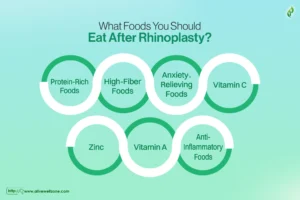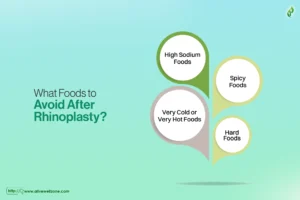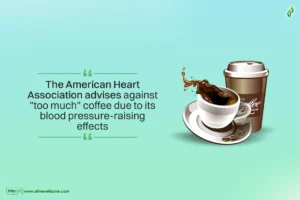Last Updated on October 21, 2024 by Helena Akter
Congratulations on getting a rhinoplasty! You’re on your way to a brand new you. Now, aside from the excitement, you need a smooth recovery. Now a big question is looming: what foods to eat after nose surgery?
You should eat protein-rich foods like eggs, nuts, fish, and poultry after rhinoplasty. Also, you need to include high-fiber foods like whole grains and fruits to avoid constipation. On top of that, eat anti-inflammatory foods like avocados and colorful veggies to reduce swelling and promote recovery.
Aside from these, we’ll also share which foods and drinks to stay away from. Plus, you’ll know actually how long you should continue this diet for a healthy recovery.
Key Takeaways
- Protein-Rich Foods: After rhinoplasty, consume protein-rich foods like eggs, nuts, fish, poultry, and dairy. They help to repair your tissues and build new blood vessels. You should aim for 1.2 to 1.5 grams of protein per kilogram of body weight daily.
- High-Fiber Foods: To avoid constipation post-surgery, include fiber-rich foods. You can consider such things as whole grains, fruits like apples and pears, and vegetables like spinach and broccoli.
- Vitamins and Minerals: Focus on foods rich in Vitamin C, A, and zinc to boost healing, collagen production, and immune support. Also, include citrus fruits, leafy greens, shellfish, and nuts in your diet.
- Foods to Avoid: Stay away from high-sodium foods, spicy meals, hard foods, and very hot or cold foods to prevent swelling and discomfort. Plus, avoid caffeine and alcohol for at least 6 weeks to ensure a smooth recovery.
What Foods You Should Eat After Rhinoplasty?
To help your new nose look and feel its best, focus on the right foods to eat after rhinoplasty. They’ll help reduce swelling, fight inflammation, and speed up healing.
So, here are the vital foods you should include in your diet.

Protein-Rich Foods
Protein is your body’s foundation And after surgery, it’s extra important! That’s because protein helps build new blood vessels and tissue to repair the injured area.
So, aim for 1.2 to 1.5 grams of protein per kilogram of body weight each day while you heal. This might be more than you normally eat.
If you don’t get enough protein, your body might break down muscle to get what it needs. It can slow down healing!
Well, a protein-rich grocery list looks like this —
- Egg
- Nuts (cashew, almond, walnut)
- Fish (salmon, halibut, cod, flounder, tuna, and snappers)
- Poultry (turkey, chicken)
- Soy based products
- Beans
- Lean meat (beef, veal, lamb)
- Dairy products (yogurt, milk, cheese)
- Lentils
- Brown rice
If you face lactose issues, you can still enjoy some dairy products. Try smaller portions, eat them with other foods, or choose yogurt and cheese. These are what to eat after nose surgery to naturally lower in lactose.
High-Fiber Foods
Constipation is no fun, especially after surgery. To keep things moving smoothly during your rhinoplasty recovery, eat fiber-rich foods. They’ll help your digestive system work its best and avoid constipation.
Here are some easy choices:
- Grains: Go for brown rice, whole-wheat bread or pasta, and even popcorn!
- Fruits: Fill up on apples, pears, and strawberries – all delicious sources of fiber.
- Veggies: Cooked carrots, green peas, baked potatoes, spinach, and broccoli are all fiber sources.
Anxiety-Relieving Foods
Rhinoplasty recovery can come with some anxiety. Don’t worry, you’re not alone! Studies show some people experience anxiety even a year after surgery.
The good news? Certain foods can help you feel calmer and more relaxed. Here are some delicious options —
- Brazil nuts: A study showed that people felt less depression and anxiety after taking a daily selenium supplement for just five weeks. This dose was about the same amount of selenium you’d get from eating 1-1.5 Brazil nuts.
- Dark chocolate: Studies suggest eating a moderate amount (about 1.5 ounces) of 70% cacao chocolate can improve your brain’s ability to make new connections. It could lead to better memory, thinking, and even mood.
- Green tea: This calming beverage contains L-theanine, an amino acid that promotes relaxation.
- Chamomile tea: This calming tea contains apigenin, a natural sleep improver. Apigenin helps your brain chill out and get ready for sleep
Vitamin C
Vitamin C is a superstar for healing after a nose job! It helps your body produce collagen, the building block for healthy skin and tissues. Even, studies show that Vitamin C can speed up recovery by raising levels of ascorbic acid in white blood cells.

The easiest way to get your Vitamin C —
- Oranges
- Lemon
- Brussels sprouts
- Grapefruit
- Kiwis
Zinc
Zinc is a vital mineral that helps your body in many ways. It helps heal wounds and boosts your immune system. In fact, it’s vital after rhinoplasty!
Most importantly, insufficient zinc can even lead to skin problems around your mouth. The good news is there are plenty of tasty ways to get zinc —
- Shellfish
- Meat
- Seeds
- Nuts
- Eggs
- Dairy products
Vitamin A
While recovering from a nose job, your body is busy healing. You need to give it a helping hand by focusing on foods rich in Vitamin A. This vitamin is vital for collagen production, which supports healthy skin and tissues.
Here’s how you can get your Vitamin A —
- Load up on leafy greens like spinach, kale, and broccoli.
- Remember colorful vegetables like sweet potatoes, carrots, and pumpkin.
- You can also include red bell peppers, tomatoes, mango, cantaloupe, fish oil, eggs, and milk in your diet.
These soft foods to eat after nose surgery will help your body heal and get you back to your regular diet quickly!
Anti-Inflammatory Foods
Now, your body is focused on healing. To help things along, include plenty of anti-inflammatory foods in your diet. For this case, you can try an animal based diet as it reduces inflammation.
Now, these foods to eat after nose surgery can reduce swelling and speed up recovery. So, load up on —
- Monounsaturated fats: Avocados, fatty fish (salmon, tuna), and extra virgin olive oil are all great when it comes to healthy fats.
- Colorful veggies: Fill your plate with a rainbow of veggies like strawberries, blueberries, broccoli, and tomatoes.
- Other Anti-Inflammatory: Don’t forget green tea and dark chocolate (in moderation) for an extra anti-inflammatory improvement.
What Foods to Avoid After Rhinoplasty?
Getting back to your favorite foods after a nose job is exciting! But for a smooth recovery, there are some things to avoid for the first few weeks —

High Sodium Foods
Salty foods can make swelling worse and slow down healing. The World Health Organization (WHO) says eating too much salt can be bad for your health, especially your blood pressure. It can increase blood pressure, which can lead to other health problems.
Plus, you should skip processed foods, canned goods, and salty snacks like chips or cured meats.
Spicy Foods
We all are familiar with the anti-inflammatory benefits of spicy meals. However, they’re not ideal for the first week after a nose job. In fact, they can irritate your insides, leading to increased swelling after surgery.
Additionally, feeling nauseous isn’t pleasant after anesthesia and spicy food might trigger nausea, adding to your discomfort.
Perhaps most importantly, Poison Control warns that extreme amounts of spice can cause serious problems including breathlessness that could be inhaled into the lungs.

So, for a smooth recovery, skip the spice for the first week and let your sensitive nose and airways heal comfortably.
Hard Foods
For a comfortable recovery after rhinoplasty, your diet needs to be soft on your face. Chewing hard, sticky, or crunchy foods can cause swelling, pain, and slow down healing.
We suggest you take mashed potatoes over potato chips for the first few weeks. It’ll help minimize your discomfort and ensure a smooth recovery. That said, most people can return to their regular diet after 2-4 weeks, depending on their individual healing process.
Very Cold or Very Hot Foods
Your mouth and nose become sensitive post-rhinoplasty. That’s why you must skip very hot or very cold foods for the first few weeks to avoid extra discomfort.
Plus, icy treats or steaming hot soup can irritate your mouth. Result? You’ll experience a least pleasing healing time. Thus, stick to lukewarm or room-temperature foods.
Continue it, until your doctor says it’s okay to enjoy your usual temperature preferences.
What Should I Drink After My Nose Surgery?
What you drink matters after your nose surgery! But not all drinks are created equal. So, here’s what to sip on for a smoother recovery:
Water and Others
Water is your best friend after rhinoplasty! Drinking plenty of it helps your body heal and reduces swelling. Aside from water, you can consider sports drinks. They aren’t just for athletes!
In fact, they can be a great choice after rhinoplasty because they contain Water, Electrolytes, and Sugars (for a quick energy boost). There are other options you can try like clear non-caffeinated soda, or warm broth.
Nutritious Drinks
To soothe your stomach and promote healing, focus on gentle and nutritious options. That said, you should skip acidic juices like orange juice. Because it can irritate your digestive system.
Instead, opt for refreshing smoothies. They’re a great way to get a dose of vitamins and nutrients, especially if you’re not eating much solid food.
Protein shakes are another excellent choice. They can help you feel full and support your body’s healing process.
What You Shouldn’t Drink After Nose Job?
You must follow specific guidelines after a nose job or rhinoplasty to avoid complications. One of the key aspects of post-surgery care is monitoring what you drink.
So, here’s what you should avoid drinking after your nose job.
Caffeinated Drinks
Following nose surgery (rhinoplasty), your body is centered on healing. While that morning coffee or tea might seem tempting, it’s best to hit pause on the caffeine for a few weeks.
In fact, The American Heart Association advises against “too much” coffee due to its blood pressure-raising effects. During rhinoplasty recovery, this extra pressure from caffeine can make swelling around your nose even worse.

To top it off, caffeine might also hinder how your body repairs tissues at a microscopic level. Sure, giving up caffeine is a challenge, but it’ll pay you off in the long run.
Alcohol
Skip the drinks after your rhinoplasty! Alcohol can slow healing and make swelling worse. It can also be dangerous when mixed with medications you might be taking after surgery.
For the safest recovery, wait at least 6 weeks before drinking again. While you might technically be okay after a week, it’s best to hold off until all swelling is gone.
How Long Should I Follow This Diet Plan After Rhinoplasty?
After nose surgery (rhinoplasty), healing takes about 1 to 2 weeks. To help your nose heal well and avoid problems, you’ll need to follow a special diet during this time.
Here’s a quick guide —
- First 1 to 2 weeks: Stick to soft, easy-to-chew foods like yogurt, mashed potatoes, and scrambled eggs. This will help prevent straining your nose while it heals.
- After 2 weeks: You can slowly add your regular foods back in.
- Important Nos: Avoid caffeine and alcohol for at least 6 weeks after surgery, and ditch smoking completely. These can slow healing.
Remember, everyone heals differently. For the best advice on what to eat after rhinoplasty, talk to your doctor. They can create a personalized plan based on your specific needs.
Final Words
We explored which foods to eat after nose surgery. By incorporating protein-rich options, fiber-filled choices, and even anxiety-reducing bites, you can actively support our body’s healing process.
Remember, the first few weeks are vital for comfortable recovery. So, you must stick to soft foods to avoid irritations.
Your recovery will be smooth and successful with nutrient-rich options and proper hydration! That said, as you move forward, you should always consult your doctor about your post-surgery diet.
FAQs
When can I start eating and drinking after rhinoplasty?
You can start eating and drinking after rhinoplasty as soon as you feel ready. It’s usually a few hours post-surgery. Initially, stick to soft foods like yogurt, mashed potatoes, and scrambled eggs. Hydrate with water and avoid caffeine and alcohol for at least 6 weeks to ensure proper healing.
What to eat on the day of your surgery?
You should eat soft, easy-to-digest foods on the day of your rhinoplasty surgery. Opt for yogurt, mashed potatoes, and scrambled eggs to prevent discomfort. Plus, drink plenty of water and avoid spicy, hard, or very hot and cold foods to ensure a smooth recovery.
What should I eat after rhinoplasty to reduce swelling?
You should eat anti-inflammatory foods after rhinoplasty to reduce swelling. In that case, include avocados, fatty fish like salmon, and colorful vegetables such as broccoli and tomatoes. Also, incorporate green tea and dark chocolate in moderation for added anti-inflammatory benefits.
What to eat 24 hours after rhinoplasty?
You can eat soft, easy-to-chew foods 24 hours after rhinoplasty. Opt for items like scrambled eggs, yogurt, and mashed potatoes. For a smooth and comfortable recovery, drink water and avoid spicy, hot, and cold foods.

